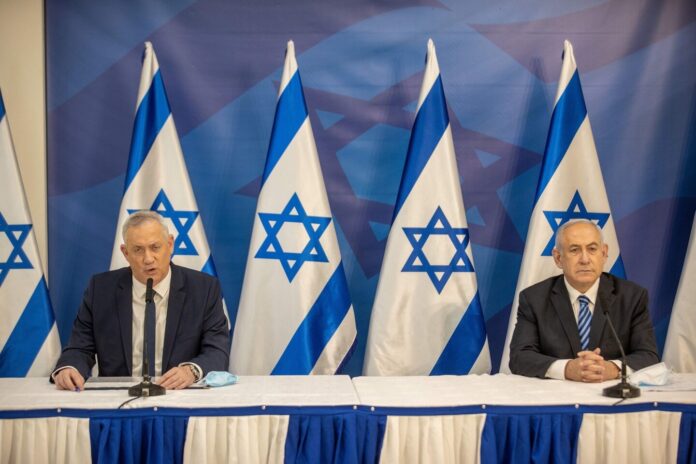The agreement will bring Gantz’s center-right National Unity party into Netanyahu’s far-right governing coalition. Gantz will join a select war cabinet that will otherwise include only Netanyahu and Defense Minster Yoav Gallant. Other members of the opposition will join a broader security cabinet.
A unity government has been widely expected in recent days amid soaring public anger at the prime minister for failing to prevent the surprise attacks by Hamas that killed more than 1,200, with even his own party loyalists calling for a new partnership with the opposition.
And it is one more example of how the shock wave set off by the weekend events has swept away the previous political reality. Before Saturday, Israel was engulfed in the most serious political discord in its history, with mass demonstrations challenging government plans to restrict the power of the judiciary.
Now, as Israel scrambles to get on a war footing, parties that were at each other’s throats just days ago have agreed to govern together, at least for now.
“There is a unity government for the State of Israel,” Economy Minister Nir Barkat posted on X, formerly known as Twitter. “At a time like this we must unite, support the IDF soldiers and act as one man until the complete victory of the State of Israel over the enemy.”
The agreement will immediately infuse the government with decades of military experience: Gadi Eisenkot, also a former Army chief of staff and member of Gantz’s party, will serve as an observer on the war cabinet. Ron Dermer, who is a close Netanyahu ally and former Israeli Ambassador to the United States, will also be an observer.
By bringing in parties from the opposition, the move may ease a sudden crisis of public confidence in the existing coalition.
“This is good news from the Israeli public’s perspective as the legitimacy of the current government is very low because of what happened on Saturday,” said Hebrew University pollical science professor Gideon Rahat. “The first function of any government is to give people security and it totally failed.”
Netanyahu has come under withering criticism since Hamas fighters streamed past a high-tech barrier undetected and rampaged through numerous Israeli towns. The military struggled to mount a rapid response as civilians battled infiltrators on their own for hours. Dozens of Israeli hostages are thought to be held in Gaza.
Gantz had immediately called for a unity government to be formed, and Netanyahu may have felt he had little choice as public support for the idea grew over the next four days. While the attacks have generated an outpouring of public support for the Israeli military and the cause of defeating Hamas, many of the families whose sons and daughters have been mobilized are not supporters of Bibi, as Netanyahu is known here.
Partnering with Gantz may ease the public’s disaffection with the government and Netanyahu’s Likud party.
“I don’t think Netanyahu really had a choice,” said Rahat. “For the first time we saw pressure from Likud insiders. Most of them are yes men for Bibi.”
The emergency coalition agreement is set to expire when hostilities are completed. In the meantime, it gives Gantz power akin to that of a co-prime minister. The small war cabinet will hold most of the authority to wage the military campaign. All other political initiatives, with the exception of vital economic measures, will be put on hold without the approval of both Netanyahu and Gantz.
Among the government plans that will be shelved for now is the divisive judicial reform overhaul, which would curtail the supreme court’s power of judicial review over government actions.
Gantz and Netanyahu attempted a similar emergency partnership during the covid pandemic in 2020. The marriage of rivals lasted only six months before the government collapsed, largely because Netanyahu refused to advance a budget. That was widely seen as a deliberate maneuver to trigger the dissolution of the government and force elections.
Political experts said it is unclear whether Netanyahu will survive in office once the war is complete and the emergency government dissolves. Much will depend on how events unfold. But there is no question that his reputation for security competence has taken a hit, and Gantz will assume significant authority, the experts said.
“From a public perspective, Netanyahu is now the weaker member of this partnership,” said Yohanan Plesner, president of the Israeli Democracy Institute. “He oversaw the biggest security failure in the country’s history, and Gantz is jumping to help.”
Opposition leader Yair Lapid has expressed support for the emergency government and has reportedly been offered an opportunity to join the coalition. Lapid has insisted in recent months that no deal with Netanyahu is possible without him removing two extreme right-wing members of the current coalition: nationalist settler leaders Bezalel Smotrich and Itamar Ben Gvir.
Gantz set aside those demands in the wake of Saturday’s attack. But those two extreme members will see their impact diminished because they are being excluded from the war-making bodies, even though they currently hold some responsibilities involved with overseeing the military and police.
“Their influence is dramatically marginalized,” said Plesner. “They haven’t been kicked out the government, but they have been kicked out of the most important part that manages the war.”



